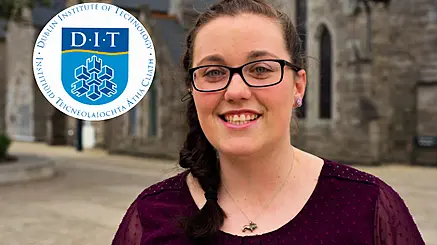"I Was Terrified The Results Would Say I Wasn't Dyslexic" - Carissa Explains It All In Our Student Of The Week Interview

"Everyone said I was real happy as a kid," says Carissa Smith.
But she wasn't. The 23-year old hated school, struggled with the work, experienced bullying and got suspended on many occasions. An ADHD diagnosis in her teens was a label she says which "does not help when you're in Secondary School." At 20, she discovered she had severe dyslexia and says going to college was something she never thought possible.
Now, the DIT student who studies Information Systems & Information Technology is a Technology Mentor for people with disabilities and was recently named 2017's Eir Disability Champion.
We had a chat with Carissa about her school experience and how her dyslexia diagnosis has changed her. When she talks about her desire to help students with learning disabilities, she oozes enthusiasm and passion.
Have you always had an interest in technology?
Yeah - when I was younger I liked taking things apart and putting them back together. I work with kids with special needs outside of college so I put the two together and decided I want to try to develop things that would help my younger sister who has special needs for when she got older.
What was school like for you?
Well, I got bullied. I think a lot of it was because I couldn't keep up with the work. My reading ability was very low for my age - I couldn't even recognise my own name. I had a reputation for being a class clown and people would it put it down to behavioural problems and I was eventually diagnosed with ADHD.
I got through school by teaching myself technology. When I went home every night, I would scan something in on my computer and make the computer read it to me. I was too embarrassed to tell people I found reading really difficult. I thought people would think I was crazy if I told them stuff was jumping around on the page.
How did things begin to change?
I went to a youth club in Blackrock and because I was getting bullied in school, I felt really safe there. I stayed on and became a junior youth leader and my mentor encouraged me to go to college. I eventually opened a youth club for kids with special needs. I feel like they don't have a lot of help, particularly if they're in the ADHD/autism category. These conditions are often seen as functioning but kids still struggle with the social side.
People believed there was a lot more to me then what others were calling a behavioural problem and I totally changed as a person.
How did you end up studying in DIT?
I've always wanted to go to college but I didn't think I'd be able for it, just because I found school so hard. I never thought I'd do anything! But people encouraged me to go and we kind of figured out by then that I had dyslexia so I got tests done. Liberties College really helped me - they put me in touch with DIT and I got in there through Access.*
I really credit Access with helping me and making me want to stay in College - it made me feel so better about things and it's great knowing I can go to them if I need to.
Carissa with Sinead McEntee and Trevor Boland, Disability Support Service, DIT
You didn't know why you found school so tough so was it almost a relief in a way when you were diagnosed with dyslexia?
Yeah, it was a bit like 'oh I'm not stupid.' I was afraid to go for the tests - I was terrified the results would say I wasn't dyslexic. Then it would be something that was just wrong with me. Now, I could show others what I did using technology. It gave me empathy and a real understanding of other people. If there are some students who have not yet been diagnosed with dyslexia, we can help them and acknowledge the fact that they're good enough to be here. College has been the making of me. I love it!
Any advice for students who are struggling with learning difficulties?
If you find people that can help, they're so worth hanging on to. I'd say as well if you have a friend who is struggling, it's important to encourage them. Hopefully one day, disability won't even be a thing. It's funny that it's called a disability - I think because I have dyslexia and ADHD, it makes me more creative. It's more an ability than a disability.
Eir is supporting an assistive technologies pilot project in DIT, which is the first of its kind. It focuses on the use of mobile and chrome-based applications that enable speech-to-text technology to encourage greater academic success and improve the student's learning experience. Its main aim is to mainstream technology in Higher Education and boost learning prospects for students, particularly those who have disabilities.
*Access is a programme that helps students prepare personally and academically for studying in DIT.